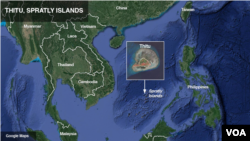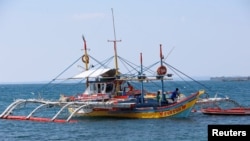Beijing is letting Philippine-registered fishing vessels access to a disputed South China Sea shoal, once the centerpiece of a bitter bilateral dispute, in an apparent goodwill gesture that would help otherwise strained Chinese relations with Manila as well as much of Southeast Asia.
China has been allowing the boats since April into Scarborough Shoal, a 150-square-kilometer (93 mile) feature with a lagoon west of the Philippine island of Luzon, official and academic sources say. It's considered a prime fishing site.
“What's happened around Scarborough Shoal has been not widely reported, but that you have Filipino fishing vessels accessing the shoal. China allowing that suggests that China in some sense is actually starting to accommodate,” said Euan Graham, international security director at the Lowy Institute for International Policy in Sydney.
The Chinese coast guard effectively controls access to Scarborough Shoal, though both countries claim it. That control has angered a large, struggling fishing population in the Philippines, just 220 kilometers (137 miles) from the shoal, closer to the fishing grounds than the nearest part of China.
The shoal lies within the Philippines' 370-kilometer (230 miles) exclusive economic zone, but China is militarily stronger than the Philippines, deterring any push back.
Chinese coast guard vessels had barred Philippine boats from the shoal since a tense two-month standoff in 2012. After Philippine vessels withdrew that year, China fortified its patrols.
That move touched off years of trouble in Sino-Philippine relations. In 2013 Manila filed for a ruling from the world arbitration court in The Hague, which found in July 2016 that Beijing lacked a legal basis to much of its claim to the broader 3.5 million-square-kilometer South China Sea.
Remarks from an official in Beijing in April indicated that China was relaxing its guard against vessels from the Philippines.
“China is making appropriate plans for Philippine fishermen who approach Scarborough Shoal or the related areas in the nearby sea for trawling business,” Chinese foreign ministry spokeswoman Hua Chunying told a media briefing April 10.
That move came after Philippine President Rodrigo Duterte set aside his government's maritime dispute with China late last year. China pledged $24 billion in aid and investment to the Philippines, which wants outside help with a $167 billion, 5-year infrastructure development plan.
Beijing, the strongest claimant among six with interests in the South China Sea, hopes upbeat Philippine ties show other countries that it can manage maritime disputes without unwelcome third-party intervention, scholars say. The world court was one such party. The United States has previously asked China to work together with Southeast Asian countries.
“Even the most minimal gestures of goodwill toward other countries, such as allowing Philippine fishermen into Scarborough Shoal, are enough to appease critics or at least defer criticism for the time being,” said Jonathan Spangler, director of the South China Sea Think Tank in Taipei.
China's consent to let Philippine vessels into the shoal now shows “tacit implementation of the (arbitration) award,” Graham said.
China claims about 90 percent of the sea, extending south from its coastline over to the Philippines and into the claims of Brunei, Malaysia, Vietnam and Taiwan. It cites historic records as a license to use those waters.
Beijing has alarmed other countries by letting coast guard vessels operate in disputed waters and by building artificial islands, some for deployments of radar systems and combat aircraft.
But since the world court ruling, China has tried to get along with other rival maritime claimants as well as the Philippines — without accepting the verdict itself.
China agreed earlier this month with 10 Southeast Asian nations to a maritime code of conduct framework aimed at preventing accidents in the disputed sea. It has separately steered tourists toward Vietnam to ease a long-festering South China Sea dispute with Hanoi by helping its economy.
In the Philippines last week, Beijing took a low profile after a legislator and chief justice accused it of occupying the Sandy Cay sandbar in part of the South China Sea's contested Spratly Islands. It also kept quiet in April when Duterte pledged to beef up Philippine holdings in the Spratlys.
Fishing boat operators from Masinloc, the Philippine coastal town closest to Scarborough Shoal, had held demonstrations and complained to mass media that China was blocking them. Lack of shoal access forces some boats to travel further for catches, adding to their costs.
If China's control over Scarborough Shoal had escalated to harassment of fishermen, it would risk angering masses of Filipinos and turning voters against Duterte's pro-China policies, analysts in the Philippines say.
Some people already think China should do more than letting Philippine vessels into the shoal as it sees fit, said Maria Ela Atienza, political science professor at University of the Philippines Diliman.
“They've said that the Chinese authorities allow them, but there are people who say why would they say allow them?” Atienza said. “These are areas that are supposed to be, if not Philippine territory, it should be shared openly."


